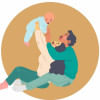Parenting 101: How to say ‘no’ without becoming the villain

Parent-child bonding is the most priceless relationship in the world. No one wants to jinx it in life for anything in the world! Yet, there are times when parents are compelled to set boundaries over children's impulsive actions. In such cases, it's quite normal to get anxious. Your actions and words directly mould their growing personality and mental development. Hence, to strike a balance between their endless curiosity and safety, it's important that we understand the context and approach of saying "no" to children.
Impact of saying 'no'…
As much as we want them to live a carefree life, there are times when children's behaviour gets out of hand. Starting from playing with sharp tools to making crucial life choices, their actions are supervised with strict restrictions. It all comes from the protective parental instinct. Although it is important to set boundaries, recurrently saying 'no' negates a parent's positive effort and intention. Rigid denial is often a counterproductive strategy.
"Despite repeated forbiddance, if a child is constantly engaged in an unwanted action, such as turning on and off a switch, he/she gets attention. This attention draws a child more towards that negative action. In such cases, saying no becomes ineffective. So, a temporary avoidance of their action works. Instead of saying no, we should navigate children, especially toddlers, towards the option they can do," explained Dr Helal Uddin Ahmed, Professor, Child Adolescent & Family Psychiatry, National Institute of Mental Health (NIMH).
When to say 'no'?
Saying 'no' is completely relative to the children's socio-cultural context. It depends on the child's age, gender, and cultural background. Varying on such aspects, their behaviour requires a strict approach, and other times, a delicate one. So, there's no hard and fast rule on saying no.
However, there is a mutual ground upon which setting boundaries for children is mandatory. In this regard, Dr Ahmed said, "Saying no to a child is needed only when their action can harm him/her, impact their functional impairment, or negatively hurt the people around them. For instance, if a teenager smokes, we should talk about the consequences of smoking and how it can harm his/her health and the surrounding people."
Thus, the primary concern of saying 'no' is whether or not the action deters their health and well-being. However, be mindful of overusing it. Say no to children wisely or else it loses its value. Keep children aware that each action comes with consequences.
Don't Dictate, Guide!
Parents should not be the decision-makers in their children's life. They are the guiding light. Children should be given the scope to think and decide for themselves. The choices they make on selecting dresses, books, games, etc. supports and develops their personality. On the contrary, most parents take a position of authority. Many tend to do the work for them. This kind of approach hampers a child's thinking capacity and growth mindset.
Emphasizing the aspect of children's decision-making ability, Dr Ahmed explained, "We should create a space for our children to think, reflect, and decide. Rather than giving a verdict, parents should mainly showcase the possible consequences of certain actions and guide them with stories, anecdotes, personal experiences, or real-life events. The rest is up to the children to shape and build their life as per their individuality."
Handling Tantrums
Let's face it, when kids get adamant on meeting their demands, it becomes tough to handle their constant nagging and crying. Be it a snack, an expensive toy, or a teen's night trip; situations can get unbearable after saying 'no' to them. Well, to handle their tantrum, the first order of business is to remove all the triggers that can aggravate their tantrum. Secondly, if they start screaming, make sure to keep your calm.
In such a situation, the best action is to ignore their tantrum and withdraw all the attention. In this regard, Dr Ahmed elaborated, "If we keep entertaining children's tantrums by meeting all their needs, they get conditioned to behave adamantly in order to get things their way. By avoiding their tantrums for the time being, they will stop at one point, realising that crying and pleading is not the solution." Moreover, for teenagers, it's important that parents also delicately explain why they are being forbidden along with the possible outcomes. Without a firm reasoning, the children's curiosity towards harmful activity will perpetuate.
Approach on Setting Boundaries
Setting boundaries for children is pivotal to drawing a fine line of an accepted behaviour. As children grow up and experience the world around them, they indulge in all kinds of action, such as jumping from high places, hitting objects, trying unusual food, using sharp objects and so on.
It's more important that parents tell what their children can do instead of what they cannot do. About the parental approach on setting boundaries, Dr Ahmed added, "As we set boundaries, our approach should not focus on what the children cannot do. That will spark their curiosity even more, especially the toddlers. Instead, tell them what they can do. For instance, if you want to restrict a child's entry into the kitchen, tell them that it's a better idea to play in the living room or playground and guide them accordingly." For older children, we must explain the outcome of certain harmful actions clearly.
Language, Tone, Gesture and Posture
Verbal and non-verbal communication plays a pivotal role. Each of our minute tones and words can have a monumental impact on children's minds. Frowning brows and harsh tone often leads them to feel rejected and misunderstood. So, parents must be immensely sensitive in the use of language and behaviour. "Parents must avoid vague phrases such as 'Let's see,' 'Some other time,' or 'We will talk about it later.' Unclear statements confuse children, reduce their sense of trust, and shrink their decision-making capacity. Language should be precise and the tone should be as welcoming as possible," explained Dr Ahmed.
Parenthood is all about teamwork. So, the father and mother must be on the same page in guiding their children. Dr Helal Uddin Ahmed, Professor, Child Adolescent & Family Psychiatry, National Institute of Mental Health (NIMH), suggests, "If the parents differ in their point of view and guide their children differently, it will create a state of conflict in the child's mind. So before saying 'yes' or 'no' to them, it is of utmost importance that both parents discuss with each other and raise children on a mutual understanding."

 For all latest news, follow The Daily Star's Google News channel.
For all latest news, follow The Daily Star's Google News channel. 








Comments